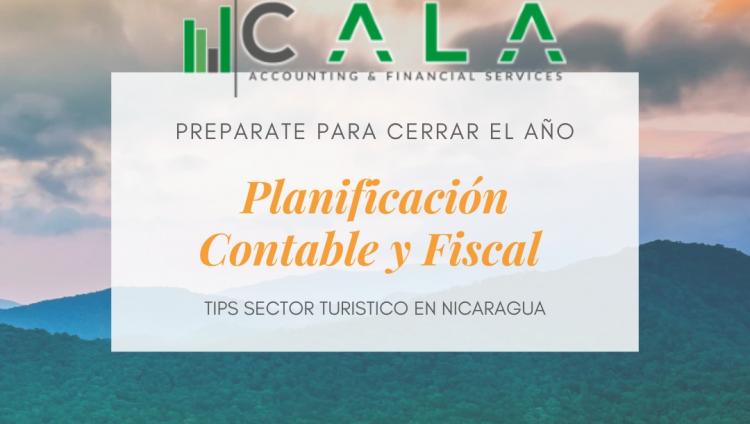Planificación contable y fiscal para el cierre de año en negocios turísticos

By Luis M. Canales, Managing Partner at CALA ACCOUNTING
Year-end is a critical period for any business, particularly for those in the tourism sector managing multiple revenue streams: lodging, food and beverage, tours, transportation, and recreational activities. For foreign investors in Nicaragua, a well-planned year-end accounting and tax process ensures regulatory compliance, tax optimization, and reliable financial statements to partners, banks, or tax authorities.
This article presents best practices for accounting and tax planning, based on Nicaraguan legislation and IFRS.
1. Year-End Accounting Preparation
A successful accounting closing preparation involves a multitude of accounting measures and updates that all businesses must implement, especially those operating in regulated sectors, such as Tourism, which combines expertise and professionalism in its activities. For these purposes, the following accounting recommendations should be considered:
a) Review of Accounting Books and Records: This includes keeping the General Journal and General Ledger up to date, along with performing a complete bank reconciliation.
b) Recording Revenue and Accounts Receivable: All income from lodging, restaurants, tours, and additional services should be recorded, and any pending invoices reviewed for the appropriate accounting treatment (provision or deferred revenue).
c) Review of Accounts Payable and Expenses: Ensure that all supplier invoices are properly recorded and reconciled, including provisions for year-end expenses (bonuses, severance, pending services).
d) Control of Inventories and Fixed Assets: This includes inventories of food, beverages, supplies, and guest items. A review of tourism-related assets (furniture, equipment, vehicles) should also be conducted, calculating depreciation and amortization in accordance with the relevant NIIF.
2. Year-End Tax Strategies
Planning a tax strategy for year-end is the most effective way to prepare for the fiscal close, taking advantage of and reviewing the accounting performance of the sector throughout the year.
a) Optimization of tax incentives applicable to the tourism and hotel sector (Law 306).
b) Provision for taxes or estimation of Income Tax, VAT, and pending withholdings in accordance with the current Tax Code.
c) Planning of deductions or deductible expenses related to maintenance, assets, training, and tourism operations.
The tourism sector relies heavily on the personnel working in the business. In most cases, staff are hired from the local area, which facilitates business operations, but the following should be considered:
Good accounting advice always goes hand in hand with excellent legal counsel for the business, to ensure its proper integration and functioning. For this reason, it is essential to review and consider the legislation applicable to the tourism sector and its corresponding benefits and incentives, particularly the following:
Year-end closing represents an opportunity to evaluate the profitability of a tourism business, optimize accounting and tax management, and present the company transparently to investors and authorities.
At CALA ACCOUNTING, we support both foreign and national investors in the tourism sector to ensure an orderly, efficient, and legally compliant year-end closing.
Comprometidos con su tranquilidad fiscal y financiera